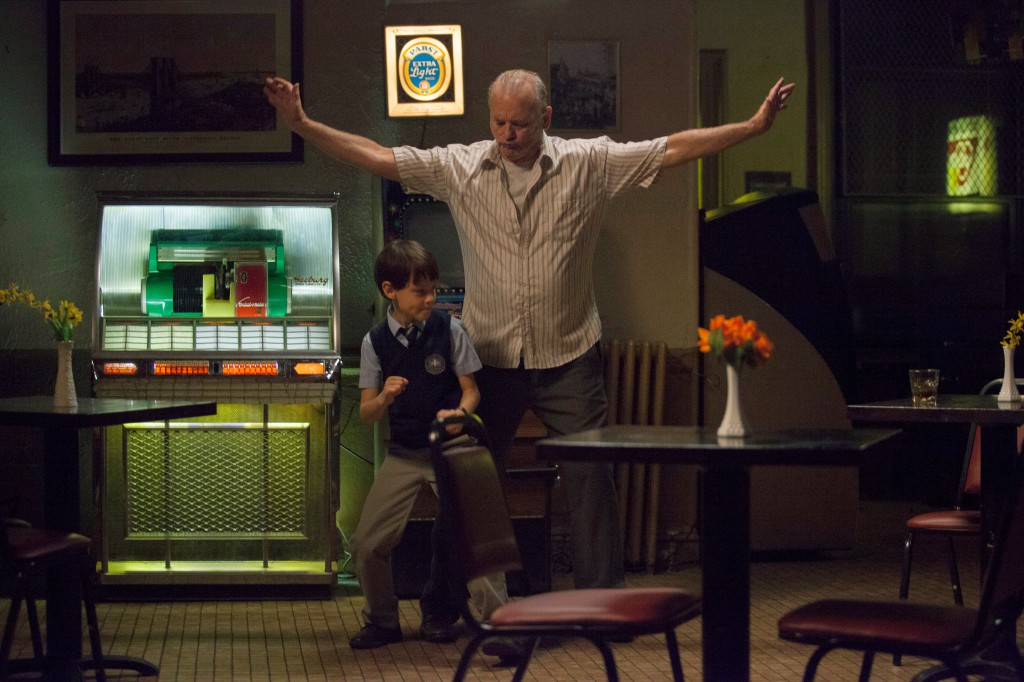
St. Vincent arrived in theaters just in time for All Saints’ Sunday, the day the church recognizes and remembers those in the parish community who have died, and all the other “saints” that went before them. It is not a coincidence; first-time director Ted Melfi must have known what was on the church calendar in some regard, given the assignment that’s handed out by Brother Geraghty (Chris O’Dowd), to his middle school class. The assignment is this: to find out about and present on a living saint in the community—not Athanasius, not Mother Teresa, not even Pope Francis—but a “saint among us”.
The project becomes the thematic backdrop for the new life of Oliver, the spindly weakling who’s just arrived at St. Thomas School, and is living with his mother Maggie (Melissa McCarthy) as they both transition into a new home after her divorce with Oliver’s father. Within moments of moving in, they are acquainted with next-door neighbor Vincent (“Vin”, played by Bill Murray), a salty and eternally peeved Vietnam vet with a drink in one hand and a cigarette in the other. He drives his wood-paneled Chrysler LeBaron to the race track, the porn shop and the bar, and and has two friends—his cat and his Russian “lady of the night,” Daka (Naomi Watts). I thought of Gran Torino’s Kowalski with more Bronx than Michigan, and a lot more intrapersonal problems.
Given the title and the setup, you can probably see where this unlikely tale is headed. The winds of fate (and middle-school bullying) leave least-likely Oliver locked out of his house one day while Maggie is working late at the hospital, and he has no alternative but to venture next door. Voila: the potential to make some babysitting dough, met with an opportunity for Oliver to learn how to place an uppercut, equals a match meant for so much more.
But if you think you can connect the dots from here, hold the ponies. This isn’t just a cutesy new friendship-against-the-odds plot. Remember, it’s a story about sainthood. And one of the things I liked about St. Vincent is the most obvious—and most offensive!—turning point the title itself offers. Vincent is not a saint, not by a long shot, at least the way we naturally view “holy people”. As Oliver gets to know Vincent, we get to know Vincent, and we watch sainthood offered to a man we didn’t know before—a man of severely dire straits, trying to make ends meet so he can afford his wife’s Alzheimer’s care at a high-end treatment center. A man who spends money he doesn’t have for a pregnant prostitute’s medical bills. On the other hand, sainthood is also offered to the same man who also happens to be a chronic gambler and alcoholic, in over his head with loan sharks and overdrawn bank accounts. In short, Oliver’s picture of sainthood is a confusing one: it is not a good man with a lot to be proud of, but a man who continues to make a mess of things at every turn, and still can’t seem to shake love loose. Lutheran Anthropology 101.
Vin’s story of sainthood is everyone else’s on screen. Besides Oliver, every adult has got some kind of issue, some hurt that’s calcified into an overall defensive disposition. Maggie is an oversharer, who tends to talk out her husband’s cheating and divorce with the hope of making it make sense, or go away. Daka is defensively nonchalant about her baby, willfully unexcited and unafraid about “it” coming into the world. Not to get gross or anything, but I kept thinking of Daka’s baby (a fatherless child of a prostitute) like the seed of God’s love that Jesus talks about. It is flung far, everywhere, and buried beneath the ground. The layers of hurt and spite and self-deception that settle around that seed and make it nearly invisible to the rest of the world. But the seed is there, doing invisible work.
In an interview, Murray called the film an “aching comedy,” which will probably be the new way I describe my everyday life. Who doesn’t live in an aching comedy? A hard-to-watch movie with a happy ending?
The only people who can see that seed of love, the importunity of sainthood, is Oliver, and the other children, the only people who haven’t grown up enough to defend themselves against it. And I won’t spoil the ending for you, but this precise awareness is what makes him and his classmates the only viable candidates for calling them up.
[youtube=https://www.youtube.com/watch?v=9dP5lJnJHXg&w=600]

COMMENTS
3 responses to “Sinner and Saint Vincent”
Leave a Reply














Wow! Thank you, Ethan. Cannot wait to see it